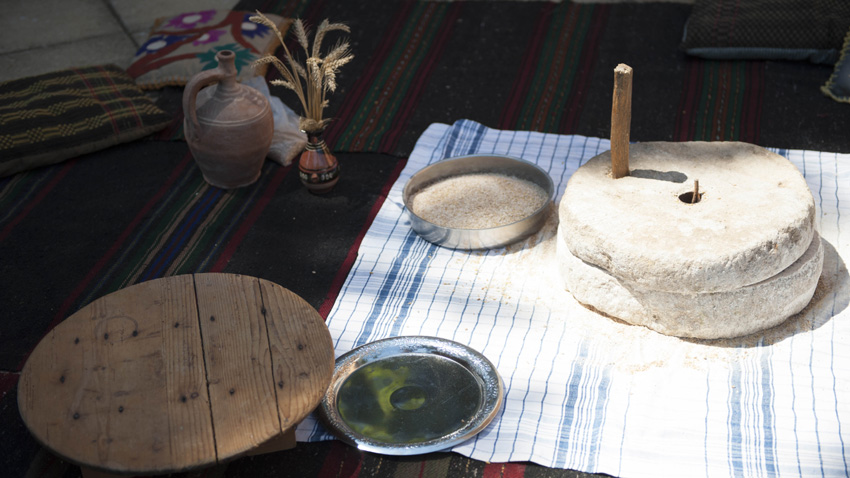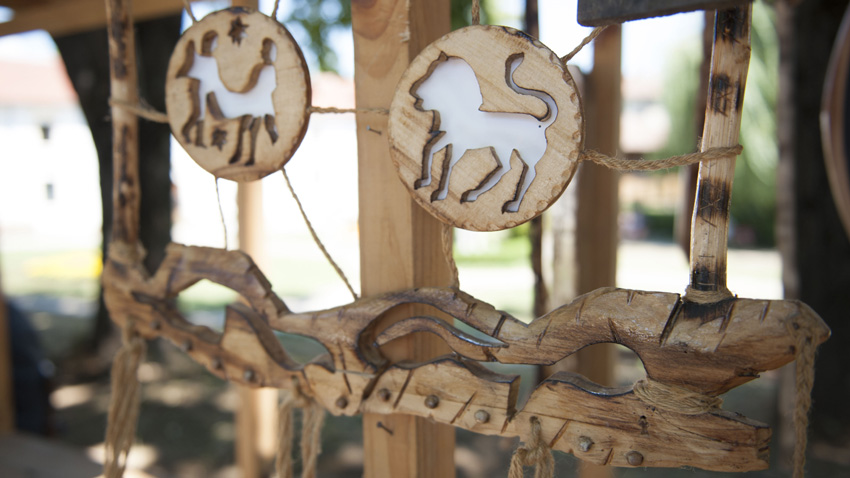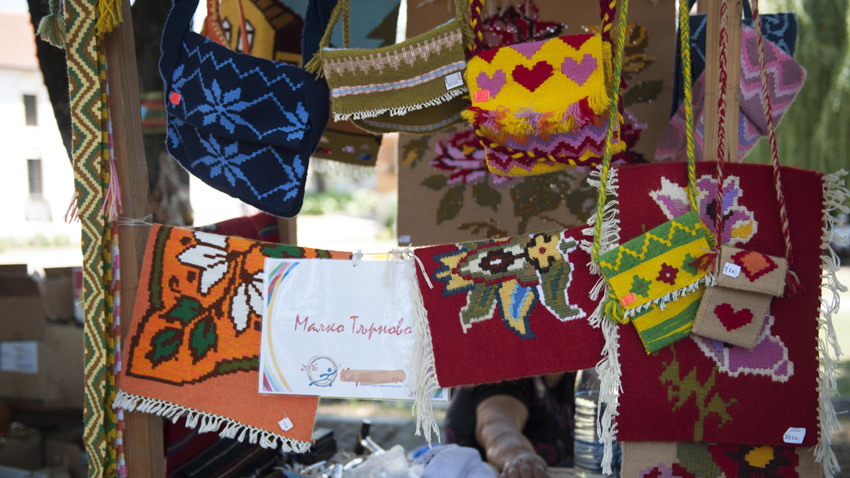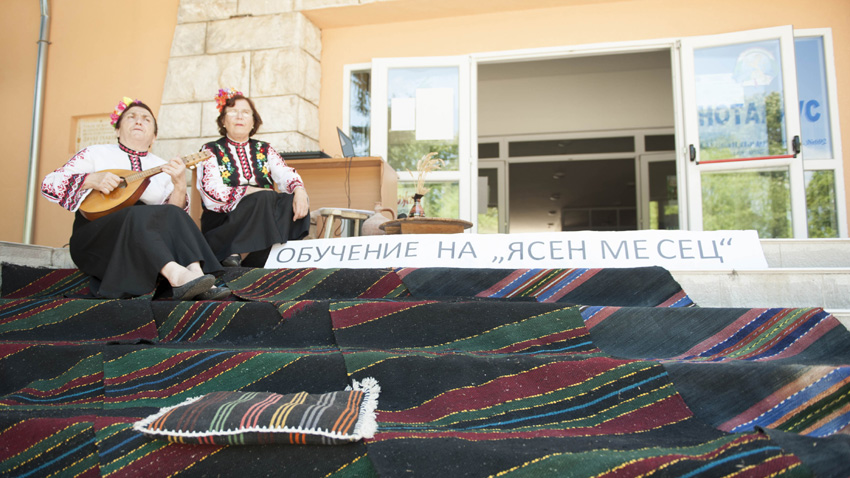As the summer has peaked, the town of Malko Tarnovo invited guests from the country and abroad to join the festival of crafts: The Malko Tarnovo Ways – from the Source of Strandja. It features the secrets of handicrafts including carpet weaving, pottery, basket making, woodcarving and knitting. Guests to the event were also given the opportunity to make something with their own hands and get a drive in a colorfully painted cart. They could see how corn is ground and how bulgur is cooked, and they also could taste a few local specialties.
 „The main crops grown in Strandja included wheat, barley, oats, flax and hemp”, Kalina Drencheva told Radio Bulgaria. She is the leader of the local vocal group Magda Pushkarova. “People traditionally grew cane to make treacle. However the main crops were grain crops. While harvesting the corn was stored in large barns. When they finished field work the locals separated better quality wheat and took it to the mills to make flour. Many sacks of flour were stored in the barns so that there was enough flour in the winter to make bread and cheesecake. Some of the best wheat was separated to make bulgur. It was traditionally cooked with meat, but also was made into deserts.”
„The main crops grown in Strandja included wheat, barley, oats, flax and hemp”, Kalina Drencheva told Radio Bulgaria. She is the leader of the local vocal group Magda Pushkarova. “People traditionally grew cane to make treacle. However the main crops were grain crops. While harvesting the corn was stored in large barns. When they finished field work the locals separated better quality wheat and took it to the mills to make flour. Many sacks of flour were stored in the barns so that there was enough flour in the winter to make bread and cheesecake. Some of the best wheat was separated to make bulgur. It was traditionally cooked with meat, but also was made into deserts.”
 Our attention is attracted by the potter's wheel of Atanas Orlov. He is proud of how his craft brings together the four elements: earth, air, water and fire. Now he has decided to show us how to make a pitcher. It is known that in old times when journeymen had to receive a master’s certificate they were asked to make a pitcher that requires remarkable skill.
Our attention is attracted by the potter's wheel of Atanas Orlov. He is proud of how his craft brings together the four elements: earth, air, water and fire. Now he has decided to show us how to make a pitcher. It is known that in old times when journeymen had to receive a master’s certificate they were asked to make a pitcher that requires remarkable skill.
 „My family has been into pottery since 1826, at least on record. There could be masters even earlier. In fact my surname Orlov (meaning eagle) comes from the trade. It derives from my hometown Aitos, not far from the Black Sea, and aetos in Greek means eagle. Our ancestors were selling pottery in Black Sea coastal towns – Pomorie, Nessebar and Sozopol, and these used to be Greek colonies and have large ethnic Greek communities. When customers saw that the cart with the pots was coming they would say that the small eagle was coming from Aitos. This is how the surname emerged. I have made efforts to pass the trade to my two sons. One of them has graduated in applied ceramics, in the leading town of pottery Troyan. I am a fifth generation of potters, and my sons will be the sixth generation of Orlov potters from Aitos. I have a potter’s wheel 100 years old and I keep it like a museum item.”
„My family has been into pottery since 1826, at least on record. There could be masters even earlier. In fact my surname Orlov (meaning eagle) comes from the trade. It derives from my hometown Aitos, not far from the Black Sea, and aetos in Greek means eagle. Our ancestors were selling pottery in Black Sea coastal towns – Pomorie, Nessebar and Sozopol, and these used to be Greek colonies and have large ethnic Greek communities. When customers saw that the cart with the pots was coming they would say that the small eagle was coming from Aitos. This is how the surname emerged. I have made efforts to pass the trade to my two sons. One of them has graduated in applied ceramics, in the leading town of pottery Troyan. I am a fifth generation of potters, and my sons will be the sixth generation of Orlov potters from Aitos. I have a potter’s wheel 100 years old and I keep it like a museum item.”
 Tonka Yovcheva has worked for 15 years in a carper-weaving workshop. Later she became a dressmaker. Now she works for the community club where traditional carpet-making is being taught so as not to disappear.
Tonka Yovcheva has worked for 15 years in a carper-weaving workshop. Later she became a dressmaker. Now she works for the community club where traditional carpet-making is being taught so as not to disappear.
„Today we make small items like purses, because rugs do not enjoy great demand, not these days. There are young people who have a desire to learn the handicrafts. The point is that the town is small, and there is no business, no work. Everything has closed down. Our looms are vertical, the others are horizontal. Vertical looms are used to weave Kotel rugs”, the woman explains as she heads to the town square. There local women will teach guests the Strandja Anthem, Bright Moon. 
English version: Daniela Konstantinova
Photos: Veneta Pavlova and Iliyan RuzhinThe latest project by director Stefan Komandarev, "The Block Universe", is one of the 35 selected projects at the most important global forum for film co-productions, the Berlinale Co-Production Market. Every year there are hundreds of candidates,..
The latest Bulgarian film "Before I Forget" can be seen in cinemas from today. It depicts the sad reality of one of the most common modern diseases - dementia. Screenwriter Teodora Stoilova-Doncheva was inspired by real events. The film is..
All necessary measures have been taken to protect the exhibits of the "Ancient Thrace and the Classical World: Treasures from Bulgaria, Romania and Greece" exhibition in Los Angeles from the raging fires in the area, reported BTA. The exhibition,..

+359 2 9336 661
